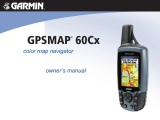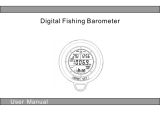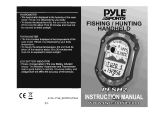
All rights reserved. Except as expressly provided
herein, no part of this manual may be reproduced,
copied, transmitted, disseminated, downloaded
or stored in any storage medium, for any purpose
without the express prior written consent of Garmin.
Garmin hereby grants permission to download a
single copy of this manual onto a hard drive or
other electronic storage medium to be viewed and
to print one copy of this manual or of any revision
hereto, provided that such electronic or printed copy
of this manual must contain the complete text of
this copyright notice and provided further that any
unauthorized commercial distribution of this manual
or any revision hereto is strictly prohibited.
Information in this document is subject to change
without notice. Garmin reserves the right to change
or improve its products and to make changes in the
content without obligation to notify any person or
organization of such changes or improvements. Visit
the Garmin Web site (www.garmin.com) for current
updates and supplemental information concerning
the use and operation of this and other Garmin
products.
Garmin
®
, City Navigator
®
, AutoLocate
®
, and
GPSMAP
®
are trademarks of Garmin Ltd. or
its subsidiaries, registered in the USA and other
countries. HomePort
™
, BaseCamp
™
, ANT
™
, and
ANT+
™
are trademarks of Garmin Ltd. or its
subsidiaries. These trademarks may not be used
without the express permission of Garmin.
Windows
®
is a registered trademark of Microsoft
Corporation in the United States and/or other
countries. Mac
®
is a registered trademarks of Apple
Computer, Inc. microSD
™
is a trademark of SanDisk
or its subsidiaries. Other trademarks and trade
names are those of their respective owners.
© 2010–2011 Garmin Ltd. or its subsidiaries
Garmin International, Inc.
1200 East 151st Street,
Olathe, Kansas 66062,
USA
Tel. (913) 397.8200 or
(800) 800.1020
Fax (913) 397.8282
Garmin (Europe) Ltd.
Liberty House,
Hounsdown Business Park,
Southampton, Hampshire, SO40 9LR UK
Tel. +44 (0) 870.8501241 (outside the UK)
0808 2380000 (within the UK)
Fax +44 (0) 870.8501251
Garmin Corporation
No. 68, Zhangshu 2nd Road,
Xizhi Dist., New Taipei City,
221, Taiwan (R.O.C.)
Tel. 886/2.2642.9199
Fax 886/2.2642.9099























